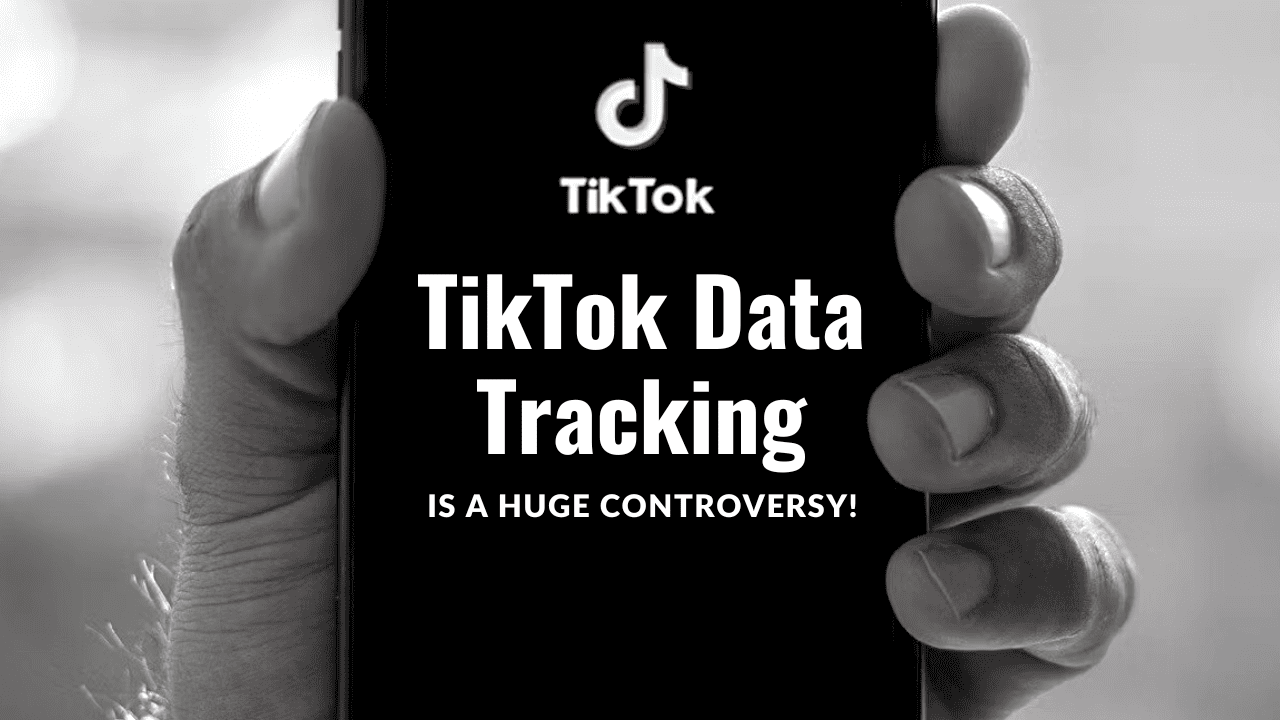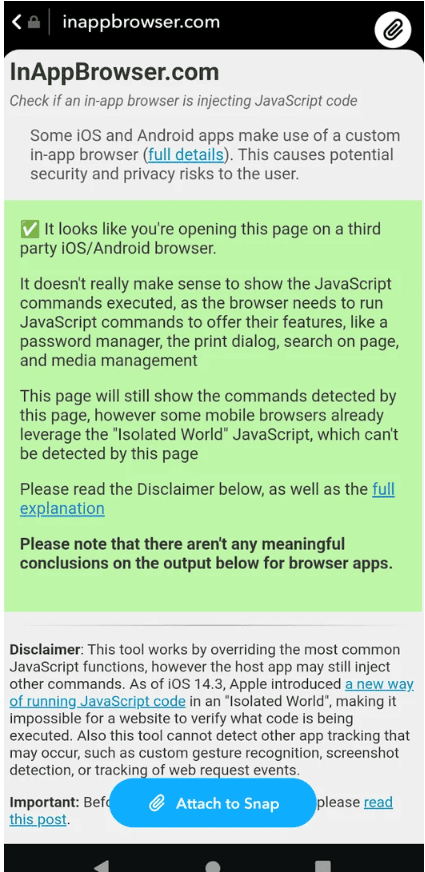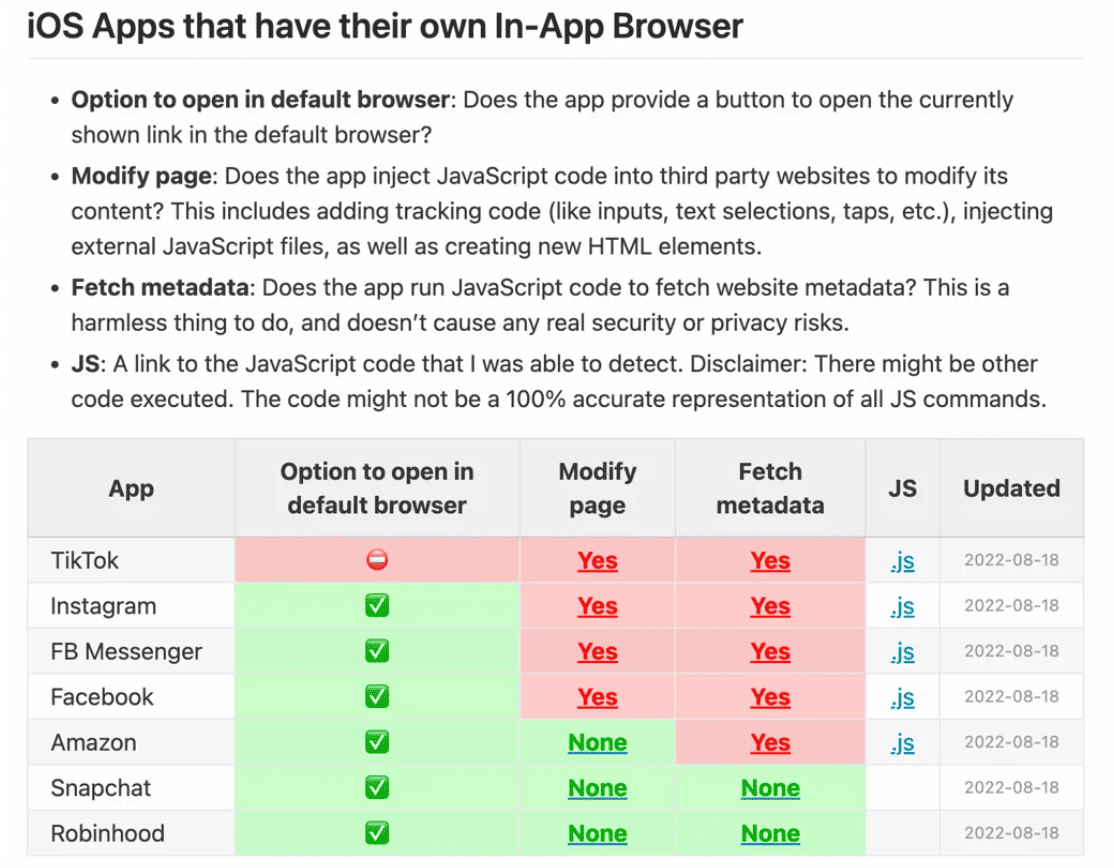TikTok, the popular social media app, has revolutionized social media marketing. But, it has also garnered attention for its alleged data collection practices, including keystroke and keyboard monitoring. As Congress considers a potential ban on TikTok, it’s crucial to explore the app’s controversial aspects. And they also identify lessons that web builders can learn from this situation. Let’s find out why TikTok data tracking method is a huge controversy!
Data Tracking Method of TikTok
In late 2022, TikTok and social media platforms owned by Meta, such as Instagram, Facebook, and Messenger, were accused of employing a new data tracking strategy.
When using apps like Instagram or TikTok, clicking on a link within the app either opens an in-app web browser or prompts the user to open it in their default browser. These in-app browsers potentially provide apps with increased access to user data.
Developer Felix Krause created a tool called https://inappbrowser.com/ in August. This enables users to identify any additional injected JavaScript commands within an in-app browser. To try it, users can share the URL within the app and open it to see the tool’s results. The example below showcases the tool’s findings on Snapchat.
Krause utilized this tool to examine the data tracking practices of various popular social media apps on mobile devices. Revealing his noteworthy findings.
Upon opening external links within TikTok, Instagram, Messenger, or Facebook. There is a possibility the respective companies will add tracking codes to gather additional user data.
For instance, if you access your bank account through TikTok’s in-app browser, it is theoretically possible for the company to monitor keystroke patterns and obtain your password. However, the mere existence of such code does not imply malicious intent.
TikTok responded to a Forbes article, confirming the presence of the code while asserting that it is not used maliciously. Spokesperson Maureen Shanahan stated, “Like other platforms, we use an in-app browser to provide an optimal user experience, but the JavaScript code in question is used only for debugging, troubleshooting, and performance monitoring of that experience — like checking how quickly a page loads or whether it crashes.”
The Necessity and Intrusiveness of Data Tracking Strategies
Advocates for the necessity of data tracking strategies argue that in-app browsers are integral to expanding tracking capabilities, enhancing user experiences with personalized content recommendations.
Supporting this claim, Prabhakar Raghavan, a Google senior VP, revealed that nearly 40% of young individuals rely on TikTok or Instagram for food recommendations, rather than utilizing Google Search or Maps.
For companies like Facebook, the ability to track user data is crucial. Forbes estimated that Facebook faced potential losses of $12 billion due to Apple’s anti-tracking measures. In-app browsers offer a means for companies to circumvent these restrictions.
However, critics argue that this data-tracking strategy exceeds simple advertising efforts and becomes excessively intrusive. The extent of data collected and its application remains unclear, raising concerns about privacy breaches and unauthorized access.
While aggressive data tracking strategies may yield short-term benefits, they show to erode user trust. According to a late 2021 study, only 13% of individuals trust Meta to safeguard the personal data of social media app users.
Irrespective of whether TikTok utilizes in-app browsers for keystroke and keyboard data tracking, the mere capability poses a threat to privacy. A survey highlighted that 72% of Americans express extreme concern regarding online privacy.
Insights from Website Data Experts
The tracking practices of TikTok have faced prolonged scrutiny, leading to the introduction of two bills aiming to ban the app nationwide.
According to a study conducted by “Disconnect,” data transmitted to TikTok can include IP addresses, unique ID numbers, and current page information. As well as user interactions such as clicks, typing, and searches, depending on the website setup.
TikTok spokesperson Maureen Shanahan explains that this data serves various purposes. This includes displaying relevant content and ads, complying with laws, and detecting fraud and inauthentic behavior.
Data tracking remains a delicate topic, and companies are actively working to enhance user privacy. Google intends to phase out third-party cookies in Chrome, following the footsteps of Safari, Brave, and Firefox, and explore alternative tracking methods due to privacy concerns.
However, new tracking techniques that bypass third-party cookies are already emerging. As a web builder, it is crucial to adhere to best practices in data handling to ensure your users feel secure when visiting your website. Remember this controversy of TikTok data tracking method when you do it yourself.
Takeaways for Web Builders
In the midst of this controversy, it becomes evident that data tracking will persist as a crucial aspect of advertising strategies. As web builders, the key lies in constructing websites that prioritize user privacy. This entails following best practices for data privacy, collecting only necessary data with user consent.
Your website serves as a reflection of your business, emphasizing the significance of establishing trust with your users. While you can’t govern how other apps and businesses track users, you maintain control over your own tracking practices.



